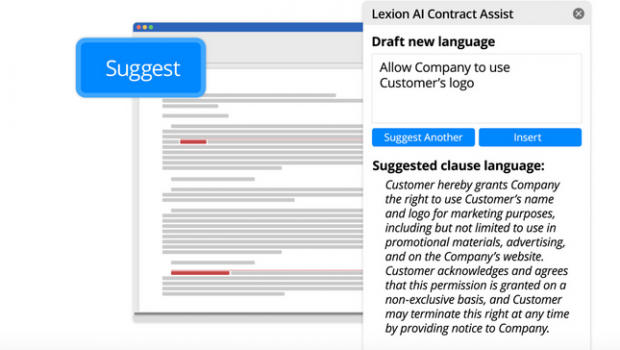Lexion leverages GPT-3 technology to assist attorneys with contracts
An attorney working through redlines on a contract may decide they want to remove uncapped liability.
If they are using AI Contract Assist from contract management provider Lexion, they can ask the tool to delete the language.
The technology, which is an addition to the company’s Microsoft Word plugin, will then make a suggestion of replacement phrasing. If the lawyer doesn’t like the first suggested replacement, they can ask for another proposed clause that they could plug in to the agreement and tweak further if needed.
This is one example of how Lexion’s newly released tool, which uses a deep learning technology called GPT-3, is designed to help lawyers complete contracting work in a more efficient manner.
“We reduce the time that in-house counsel need to invest in the contract review process by providing them with suggestions that they can use as a starting point,” Lexion CEO and Co-founder Gaurav Oberoi told Legal Dive. “This is similar to how products like Gmail help suggest sentence completions, but for redlines in a contract.”
GPT-3
GPT-3 has been in the news a lot lately because of its use to power OpenAI’s ChatGPT tool that users around the globe have been testing out for a wide array of use cases.
GPT-3 refers to the third generation Generative Pre-trained Transformer, a neural network machine learning model that can generate large volumes of machine-generated text, according to techtarget.com.
Oberoi said Lexion has been experimenting with GPT-3 since late 2021, and the company only recently started making it available to beta customers as part of AI Contract Assist.

Gaurav Oberoi
Courtesy of Lexion
However, he said, since the company was founded at the Allen Institute for AI in early 2019, it has used AI-powered large language models that can read, summarize and translate texts.
Other use cases
Beyond suggested redlines, Lexion’s AI Contract Assist can also generate contract clause language.
For example, an attorney may want to add a clause in a customer contract that grants permission to use the customer’s logo in company marketing materials.
Instead of drafting one from scratch or searching for a Google template, the lawyer can type into Contract Assist: “Clause allowing company to use customer’s logo.” They then click on the “suggest” button and a proposed clause is produced, which they can edit further if needed.
“The attorney is still the driver, which means that they still retain control and therefore don’t give up on quality,” Oberoi said.
Additionally, Contract Assist allows users to insert clauses from a playbook or prior contracts, and it summarizes clause language.
Next steps
Overall, Lexion’s new tool is designed to help lawyers spend less time drafting and negotiating low-complexity legal language and more time on higher-level tasks.
And Oberoi told Legal Dive that Lexion is not done developing potential use cases for GPT-3.
“Generative models like GPT-3 bring incredible new capabilities to working with text, and we are actively researching ways to continue to improve results, as well as apply this technology in novel ways,” he said.








Gloss